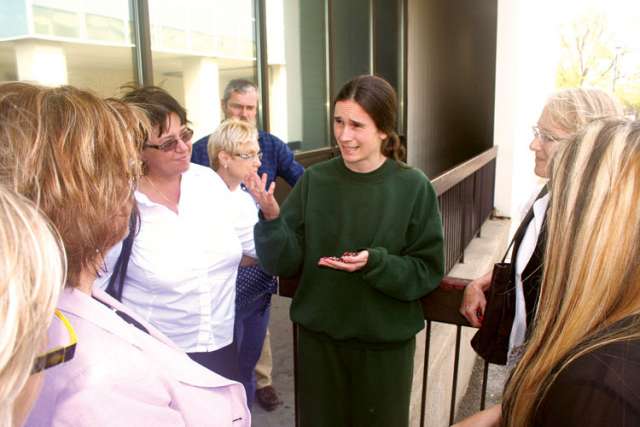Mary Wagner was found guilty of mischief and four counts of failing to comply with probation orders for entering the Women’s Care Clinic on Lawrence Avenue West in Toronto in August 2012. While inside, she offered roses and attempted to speak to patients. Justice Fergus O’Donnell sentenced her to five months in jail on the mischief charge and a further four months for the breaches of probation. However, because the time served exceeded the sentences, she was immediately released. She also received a further two-year probation term, with stipulations she stay at least 100 metres away from any abortion location.
The criminal charges are incidental to Wagner’s constitutional challenge, in which she has engaged the services of lawyer Dr. Charles Lugosi, a law professor and constitutional expert. The effort is focused on Section 223 of the Criminal Code of Canada, which defines a human being as existing only after he or she has fully emerged from the birth canal in a breathing state. To that end, Wagner has relied on self-defence provisions in the Criminal Code, positing that she was acting to prevent a fatal assault on the preborn inside the Women’s Care Clinic the day she entered.
In a rare development, the trial heard witness testimony from the lead abortion practitioner at the site, Saira Markovic, as well as nurse Khatija Akojee, receptionists and a police officer. When Wagner testified later, there were differing views over what transpired at the abortion site — Wagner said she was sworn at, threatened and manhandled, but the abortion employees denied that happened. Video surveillance footage from the scene was taped over by the clinic.
In earlier rulings, and with the support of Crown attorney Tracey Vogel, O’Donnell denied public funding for Wagner’s constitutional challenge and also turned down her standing to make a constitutional argument. Lugosi had called Section 223 an unconstitutional “legal fiction,” necessitating the determination of scientific and legal facts to ascertain when a human being is created. He had two expert witnesses from the United States ready to testify as to the humanity of the preborn before O’Donnell’s denial.
O’Donnell ruled Wagner’s challenge had no possibility of success in the current state of Canadian law. His position, and that of the Crown, contrasted with the treatment accorded in the 1980s to late abortion-rights crusader Henry Morgentaler, who was allowed to put forth constitutional arguments challenging laws restricting abortion then in force and succeeded in overturning them through a 1988 Supreme Court decision.
Although Wagner’s trial is over, the case is far from finished, as she has announced her intention to appeal O’Donnell’s decisions and continue the challenge in higher courts. To that end, her supporters have established a defence fund to cover her legal costs, which so far has raised more than $140,000. The monies have allowed Lugosi to engage the services of a co-counsel to assist him.
For reasons of conscience, Wagner refused to agree to bail conditions that would have freed her from prison pending the conclusion of the trial and so spent the duration of it incarcerated at the Vanier Centre for Women in Milton, Ont. Released from the courthouse still wearing green prison garb on June 12, and to hugs and congratulations from about three dozen supporters, Wagner said she felt “free, inside and out, and it’s beautiful to see the people again — the good friends on the outside we’ve been separated from for a long time. So thanks be to God.”
As a devout Catholic, her immediate plans were to attend Mass that evening, make her way to the west coast, where her family lives, “and then take some time to pray in solitude … and be open to God’s will.”
Wagner said she looked forward to the upcoming appeals, but acknowledged that ultimately, “the victory is not so much in the courts … the call to love our neighbour who is in distress, who is in imminent danger, remains. So I hope, God willing, to continue to reach out to the mothers and children who are in danger.”
(Gosgnach is a freelance writer in Hamilton, Ont.)


